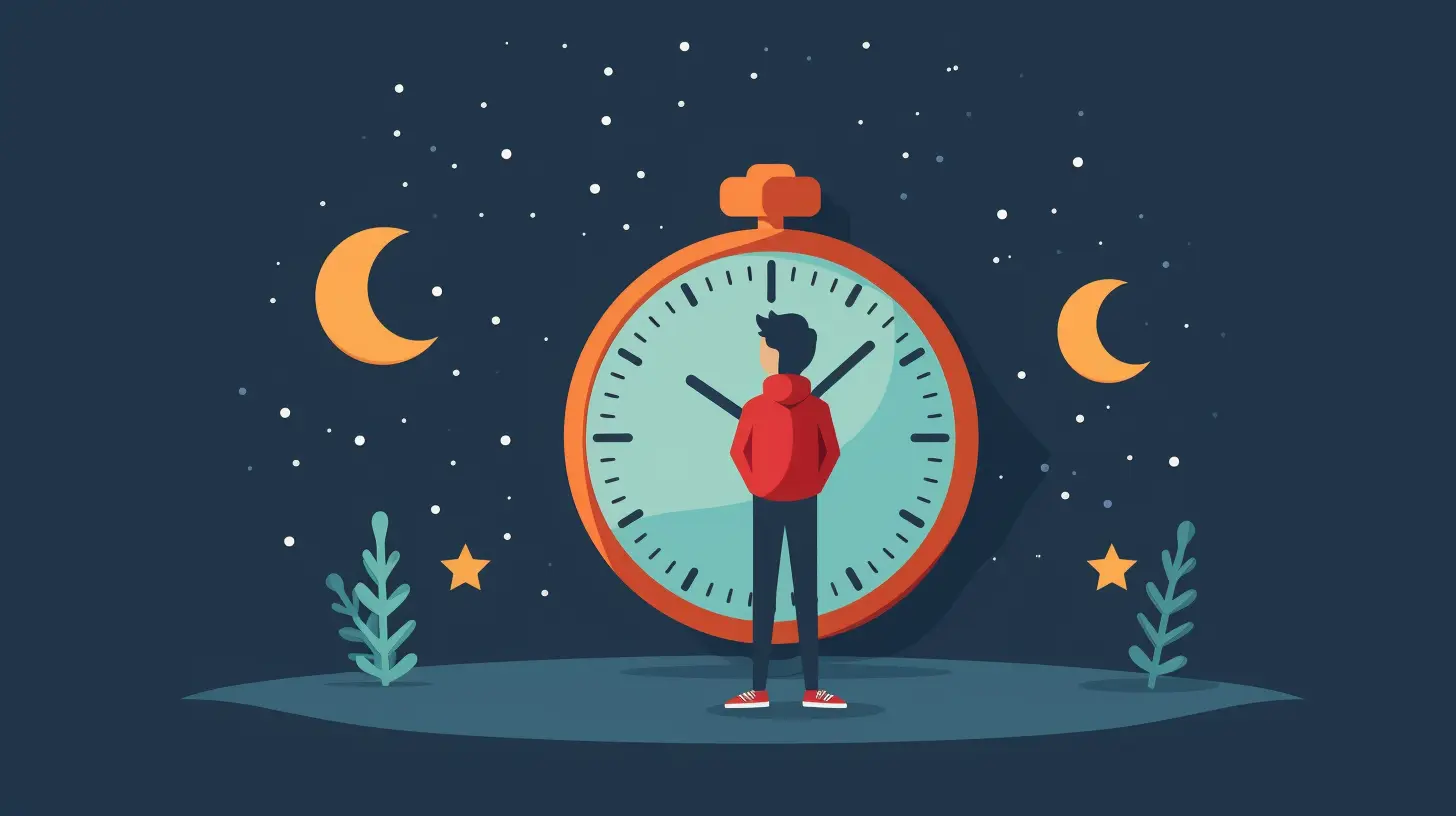How to Recover from Sleep Debt and Get Back on Track
28 July 2025
Let’s be honest — we’ve all pulled an all-nighter or binged one too many Netflix episodes until our brain whispered, “just one more”... until the sun came up. And then we go about our day acting like zombies pretending to be functioning adults. Sound familiar? If you’re nodding your sleepy little head, you, my friend, are suffering from a big ol' pile of sleep debt.
But fear not, fellow night owl! Whether you’ve been sleep-skipping for finals, work, or just because TikTok has an iron grip on your attention span, there’s still hope. Let’s break down what sleep debt really is, how it messes with your body and brain, and — most importantly — how to recover from sleep debt and get back on track without needing to live like a monk clutching a lavender-scented melatonin diffuser.
🧠 What the Heck is Sleep Debt?
Imagine your body has a sleep bank account. Every night you skip out on the recommended 7–9 hours, you’re swiping your snooze credit card and going into sleep debt. Unlike financial debt, you can’t just declare bankruptcy and walk away from the consequences — your brain remembers, and your body keeps the receipts.So, let’s say you only slept 5 hours on Monday and Tuesday. That’s a 4-hour sleep debt right there. Now compound that over weeks (or months), and it's no wonder you feel like you’ve aged 47 years and have the energy of a damp sponge.
😴 How Sleep Debt Sneaks Up on You (And Why It’s a Big Deal)
Most people brush off sleep loss like it’s no biggie. “I’ll catch up on the weekend,” they say. Spoiler alert: that doesn’t really work.Here’s why sleep debt is the annoying roommate you never asked for:
- Brain fog & poor memory: Trying to think on a sleep-deprived brain feels like swimming through mashed potatoes.
- Mood swings: One minute you're fine, the next you're crying because your toast broke in half.
- Weakened immunity: Yep, sleep-deprived you is more likely to catch the plague (or at least a nasty cold).
- Weight gain: Sleep debt messes with your hunger hormones — suddenly that entire pizza seems like a salad.
- Increased risk of chronic diseases: I’m talking heart disease, diabetes, and some other unsexy stuff.
See? Sleep’s not just for the weak — it’s for the smart and healthy.
🛌 Can You Repay Sleep Debt?
The million-dollar question: Can you actually make up for lost zzz's?Well, yes... and no. (Annoying answer, I know.)
Short-term sleep debt — like losing a few hours over the weekend — is fixable. Your body is surprisingly chill about letting you catch up over the next few nights. But if you’ve been skimping on sleep for months or years? That kind of chronic sleep debt can’t be fully repaid. At best, you can reduce its impact and start healing with consistent, quality sleep.
Bottom line: Treat sleep debt like real debt — the longer you ignore it, the worse it gets.
Now, let’s get into the good stuff: how the heck do we fix it?
🧘♀️ Step-by-Step: How to Recover from Sleep Debt and Get Back on Track
Recovering from sleep debt doesn’t require witchcraft or sleeping for 17 hours straight (although... tempting). Here's how to do it properly.1. Accept It – You’re Sleep Broke
Step one: admit you have a problem.Stop romanticizing hustle culture. Sleep isn’t a luxury — it’s your body’s maintenance mode. Embrace the fact that you're sleep-deprived and commit to turning it around. You wouldn’t drive your car with the check engine light on... so why do that to your brain?
2. Set a Consistent Sleep Schedule (Even on Weekends)
Your body has a circadian rhythm — that’s just a fancy term for your internal clock. And it loves consistency. Sleeping in until noon on weekends may feel glorious, but it actually confuses the heck out of your body.Go to bed and wake up at the same time every day (yes, even Saturday). Over time, your body will get the memo and start falling asleep faster and waking up more refreshed. Think of it like training a stubborn dog — firm, consistent, and with the promise of snacks (ok maybe not snacks, but definitely clearer skin and better moods).
3. Go to Bed Earlier (Gradually)
Don’t try to go from midnight owl to 9 PM in-bed-with-a-book grandma overnight. That’s a fast track to lying in the dark questioning your life choices.Instead, move your bedtime back by 15–30 minutes every few nights. Baby steps, people. Eventually, your body will adjust.
And please — ditch the phone at least 30 minutes before bed. Blue light is basically your sleep’s arch-nemesis. If you must scroll, at least use Night Shift mode and dim that screen down to “Cave Dweller” brightness.
4. Take Power Naps (But Don’t Go Overboard)
A 20–30 minute nap can be a game-changer. Think of it as a shot of espresso without the jitters.But here’s the deal: longer naps (especially over an hour) can mess with your nighttime sleep and leave you feeling groggier than before. We’re trying to fix the problem, not go full Napoleon and conquer the land of dreams.
5. Optimize Your Sleep Environment
You can’t expect to sleep like royalty if your bedroom feels like a rave or a wrestling match with pets and noisy neighbors.Pro tips:
- Keep it cool (60–67°F is the sweet spot)
- Make it dark (blackout curtains or a sleep mask = chef’s kiss)
- Quiet, please (or use a white noise machine to muffle street fights and snoring partners)
- Comfy bedding (because you deserve to feel like you’re sleeping on a cloud, dang it)
6. Watch the Caffeine and Nightcaps
Sorry, coffee lovers — that 4 PM cold brew might still be lurking in your bloodstream at bedtime. Caffeine can stick around for 6-8 hours, so try cutting it off after noon if you’re struggling to fall asleep.And alcohol? Sure, it knocks you out fast, but it messes with your sleep quality. It’s like hiring someone to clean your house, then finding they just swept everything under the rug.
7. Fill Up Your Sleep Bank — Slowly
We get it — you want to pass out for 12 hours and wake up a brand new human. But long sleep binges don’t always help, especially if you whiplash back to 5 hours the next night.Try this instead:
- Add an extra 30 to 60 minutes of sleep each night for the next week or two.
- Prioritize quality over quantity. Deep, uninterrupted sleep > tossing and turning for 10 hours.
- Listen to your body. If you feel like a raccoon by Thursday, get to bed earlier instead of pushing through with Red Bull and regret.
8. Exercise (But Not Too Close to Bedtime)
Moving your body during the day can help you sleep more soundly at night. Just don’t hit the gym at 10 PM and expect to zonk out right after. That post-workout adrenaline will have you counting sheep until sunrise.Aim for morning or early evening workouts. And yes, dancing like a maniac in your living room totally counts.
9. Consider Your Mental Health
Anxiety, stress, and endless to-do lists love to crash your sleep party uninvited.Try winding down with a routine you actually enjoy — hot showers, journaling, a podcast narrated by someone with a voice smoother than peanut butter... whatever helps signal to your brain that it’s time to chill.
If anxiety is stealing your sleep every night, it might be worth chatting with a therapist or sleep specialist. No shame in asking for help — your brain deserves to be operating on something better than fumes.
10. Be Patient — Sleep Recovery Takes Time
There’s no “one-size-fits-all” timeline for sleep debt recovery. Some folks bounce back in a few days, others might take weeks to fully reset.Don’t expect miracles overnight. Think of it like rebuilding trust with your body — you’ve ghosted it for a while, so now you’ve got to show up consistently.
🦥 Bonus Tip: Stop Bragging About Being Tired
“I only slept 3 hours last night, but I still crushed that meeting.”Buddy, that’s not a flex — that’s a cry for help.
Let’s stop acting like exhaustion is a badge of honor. Prioritize your sleep like you would your job, your pet, or your fridge full of leftovers. Because when your body gets the rest it needs, everything else — mood, focus, energy, skin, relationships — levels up.
🛑 So, Let’s Wrap This Up
If you’ve been burning the candle at both ends and wondering why you feel like a potato with an email address... now you know.Sleep debt is real. It’s annoying. But it’s fixable — with a little consistency, some cozy PJs, and a bedtime that doesn’t start with 1 A.M.
Remember: Sleep is not lazy. Sleep is self-care. Sleep is the ultimate glow-up.
So tonight, do your body a solid — shut the laptop, silence your group chat, and tuck yourself in. Your future well-rested self will thank you.
all images in this post were generated using AI tools
Category:
Sleep HealthAuthor:

Laura Hudson
Discussion
rate this article
1 comments
Niva McKinnon
Sleep debt isn’t just a nuisance; it’s a health crisis! Prioritize your rest like your life depends on it—because it does! Reclaim your sleep, reclaim your life!
August 16, 2025 at 4:50 AM

Laura Hudson
Absolutely! Prioritizing sleep is essential for overall health and well-being. Thanks for emphasizing its importance!


